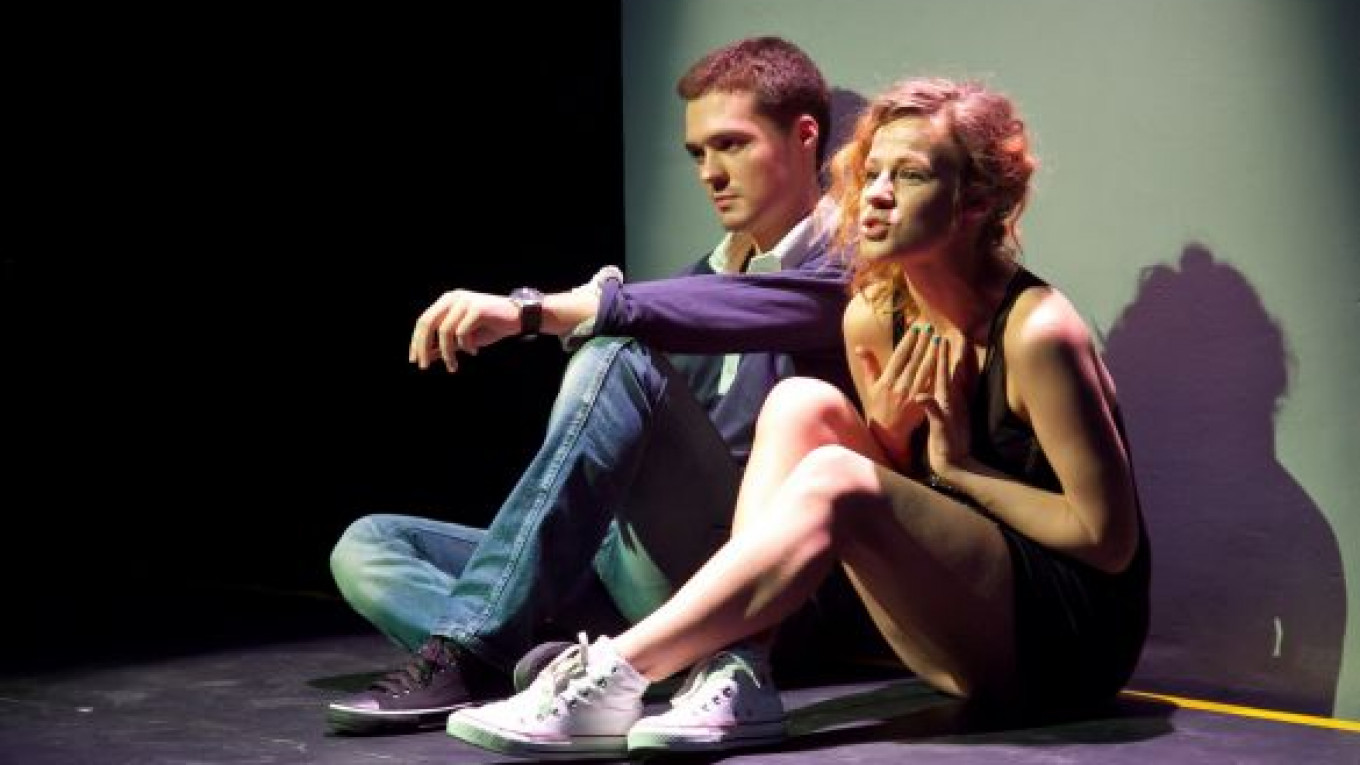Maxim Kurochkin’s “The Schooling of Bento Bonchev” is a play that has been on the slow burner for years. It was written a half-decade ago, has been mounted as a staged reading in various guises and languages, has been published in Russian and English (for the latter of which I must claim blame), but only now has been staged by Mikhail Ugarov at the Playwright and Director Center.
Over this time the play has changed subtly, with new scenes being added, some characters’ roles being enhanced and others’ being removed.
I mention the back story for a reason: to indicate how a few seemingly minor changes can be enough to set up a big surprise. I know this play inside and out, I have seen it at various stages of its development — including at a reading as recently as September at the Lyubimovka youth play festival — and yet what I saw on stage at the Playwright and Director Center nearly threw me for a loop.
Mikhail Ugarov found a way to be both brash and understated in his direction. He did a beautiful job bringing out the naivete, the purity of intent, and the innocence that Kurochkin put into this provocative and affectionate play about sex and love.
Bento Bonchev is an American grad student of Bulgarian descent who, in the not-too-distant future, rebels against his dissertation advisor, with whom he is studying the prehistoric, lost art of sexual relations. He cannot believe anything so barbaric ever had a place in human behavior on earth. Surely it is just one more of the myths and metaphors that crazy poets conjure to describe what they don’t understand.
However, a chance meeting between Bento and a girl who mistakenly locks her bicycle to his has major repercussions that affect him for decades, even though this apparently never occurs to him.
Bento is one of those archetypical males with his head in the clouds, his ego on his sleeve and his heart stuffed out of sight somewhere in a deep, deep pocket.
Kurochkin, who has an extraordinary ability to create new styles and forms of drama with almost every play he writes — and he has written more than two dozen — created in “Bento Bonchev” a delightfully naive comedy that at times borders on the infantile. It goes without saying that he takes his play to the edge of corn with a very serious purpose in mind.
What is there left to say about love? What can you show that has not been shown? What arguments can you make that have not been made?
Kurochkin did an end run around everything that has come before him by putting us back in school, a place where we remember knowing nothing and learning less. The college setting was the writer’s tongue-in-cheek version of a tabula rasa and it worked beautifully.
The image of the bicycle, which Ugarov uses frequently and to excellent effect, is the key. Sex or no sex, this play is about kids playing at being adults — and about some adults who do not realize that they are no longer kids.
It is telling that two scenes containing full-frontal nudity are the most touching and chaste of the entire production.
“The Schooling of Bento Bonchev” is a play about cynicism, hope, the tedium of dogma, and yes, as trite as it may look written on the page, the resilience and wild paradoxes of love.
The performance begins with a brand-new scene about which I knew nothing, and which succeeds in pulling together beautifully the child-adult dichotomy around which the work is built. It is not, however, a scene I can describe — that would be worse than leaking the ending of an unpublished “Harry Potter” novel.
Ugarov coaxed marvelous performances from the entire cast, who work on an empty stage sandwiched between risers on which two sections of spectators sit.
Igor Stam’s Bento is equal parts handsome, eager youth and thick-headed demagogue. As Sandy, the girl who locks her bike to Bento’s and changes the course of several individuals’ lives, Alexandra Rebenok is enigmatically wise, and as sexy as a girl in a sexless society could possibly be.
Playing two television talk-show lovers from the ancient past, Konstantin Gatsalov and Arina Marakulina are superb. Regal, pompous and tough as nails, they provide some of the clearest humor and emotion of the show.
“The Schooling of Bento Bonchev” is fresh, ironic and buoyant as it takes on the oldest topic in the world and makes it look brand new.
“The Schooling of Bento Bonchev” (Klass Bento Boncheva) plays Jan. 29 and 30 at 8 p.m. at the Playwright and Director Center, located at 5 Begovaya Ulitsa. Metro Begovaya. Tel. 945-3245, www.cdr.theatre.ru. Running time: 1 hour, 45 minutes.
A Message from The Moscow Times:
Dear readers,
We are facing unprecedented challenges. Russia's Prosecutor General's Office has designated The Moscow Times as an "undesirable" organization, criminalizing our work and putting our staff at risk of prosecution. This follows our earlier unjust labeling as a "foreign agent."
These actions are direct attempts to silence independent journalism in Russia. The authorities claim our work "discredits the decisions of the Russian leadership." We see things differently: we strive to provide accurate, unbiased reporting on Russia.
We, the journalists of The Moscow Times, refuse to be silenced. But to continue our work, we need your help.
Your support, no matter how small, makes a world of difference. If you can, please support us monthly starting from just $2. It's quick to set up, and every contribution makes a significant impact.
By supporting The Moscow Times, you're defending open, independent journalism in the face of repression. Thank you for standing with us.
Remind me later.







